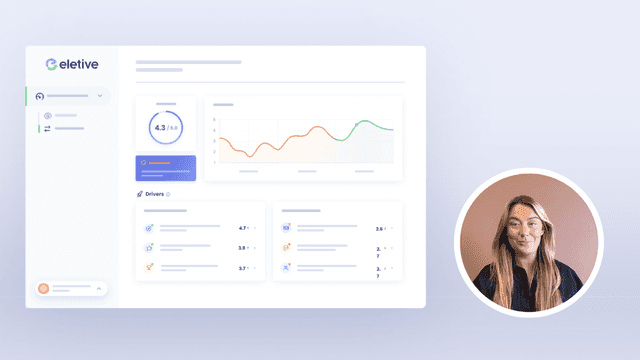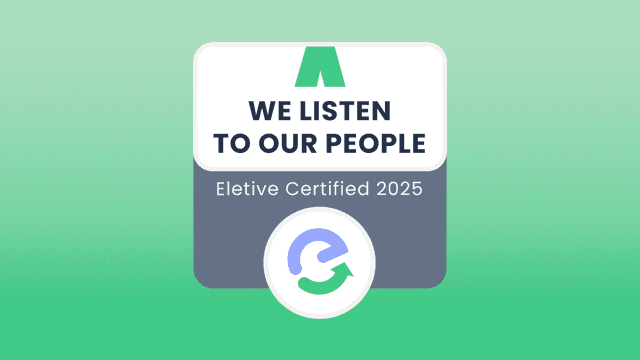Employee engagement is an essential success factor in all organisations. In this article, we take a closer look at how to increase employee engagement in manufacturing.
Ever walked into a bustling factory? The humming machines, the rhythm of assembly lines, and sparks flying from welding works - it's almost like an orchestra.
But what if we told you there’s another tune playing beneath this symphony?
It’s called 'employee engagement', a key element in manufacturing that often goes unnoticed.
You see, every cog in the machine matters – including human ones. In factories across the globe, employee engagement is becoming as vital as any piece of heavy machinery or innovative tech solution.
Engaged employees bring more to their roles: they're productive powerhouses, quality watchdogs and culture builders.
What is employee engagement in manufacturing?
In manufacturing, where precision and teamwork are crucial, engaged employees play a pivotal role in achieving operational excellence.
Engaged manufacturing workers don't view their jobs as mere tasks to be completed. They see their roles as integral components of the company's success. This sense of purpose extends well beyond monetary compensation.
It's about making a tangible difference and contributing to the bigger picture.
Importance of employee engagement in manufacturing industry
Quality improvement is a benefit of high employee engagement levels.
When employees take pride in what they do, it shows in their workmanship—fewer defects occur, leading to cost savings from reduced waste or rework time.
Gallup research identified significant variances in business results between units and teams that rank in the highest quartile for engagement and those in the lowest quartile.
For example, there were:
64% less safety incidents or accidents
41% less product defects
These statistics illustrate how focused and invested employees make fewer mistakes – again underlining why engaging your staff makes sound business sense.
The benefits aren't just numerical though. An engaging workplace cultivates positivity, helping staff feel more valued and content at work.
Hay Group research found that companies with high engagement levels enable their staff to be 4.5 times more likely to give extra effort when required - which can make all the difference during those tight deadlines or challenging projects.
Maintaining engagement is an ongoing process. It's about creating the right conditions for all members of your manufacturing team to give their best each day - committed to their work and values, motivated to contribute towards organisational success with an enhanced sense of their own well-being.
Leadership best practices in manufacturing
The role of leadership is vital in shaping a positive work culture and driving employee engagement. For manufacturing industries, this often translates to operational excellence and empowering employees.
Focus on operational excellence
A focus on operational excellence not only improves productivity but also enhances employee engagement.
By setting clear goals, leaders can guide their teams towards achieving quality outcomes.
An effective leader maintains high standards while continuously seeking improvements. Creating an atmosphere in which each person feels appreciated for their efforts to help the organisation reach its objectives encourages a positive working environment.
Empower your employees
To truly engage your workforce, it’s essential to empower them. Giving employees autonomy over their tasks encourages ownership and boosts morale.
Gallup reports a 23% increase in performance when employees feel empowered at work—demonstrating the real impact of such practices.
Promote open communication
Promoting open communication within the workplace helps build trust between management and staff members. When people feel comfortable sharing ideas or concerns without fear of retribution, they are more likely to stay engaged with their roles—and contribute innovative solutions that drive business growth.
Remember: Leadership isn't about dictating; it's about guiding your team towards shared objectives by fostering a supportive environment.
How to improve employee engagement in manufacturing
Strategy 1: gather employee feedback with pulse surveys
Pulse surveys are quick, targeted questionnaires that let you take the 'pulse' of your workforce.
They're an excellent tool for understanding how your manufacturing employees feel about their jobs and the workplace.
In fact, these regular check-ins can give valuable insights into employee morale, satisfaction levels and potential issues before they become major problems.
However, it is not just about collecting the data - making use of it to bring real changes in the organisation will demonstrate that employees' opinions are valued.
Taking action on survey results shows employees their voices matter - a key factor in engagement. It’s not merely about gathering data but using it to make tangible improvements within the company. This could be as simple as addressing concerns over break times or more complex like changing production processes based on staff suggestions.
Eletive understands the power of pulse surveys in driving engagement particularly among manufacturing workers who might not have access to traditional digital channels for feedback like emails or intranets due to lack of personal devices at work.
To bridge this gap, Eletive offers a unique KIOSK solution where any worker can participate in these vital surveys without needing a company phone or computer – truly democratising feedback.
By giving every member of your team an equal voice regardless of role or seniority level, we help foster a deeper connection between management and ground-level staff leading to increased trust and overall productivity.
Strategy 2: Lean and agile practices
The world of manufacturing is not a stranger to change. To stay competitive, companies often turn to lean and agile practices.
These methodologies aim for efficiency by reducing waste, improving processes, and responding quickly to changes.
Agile methodology, originally designed for software development, has found its place within the manufacturing industry as well. Its emphasis on collaboration allows employees' voices to be heard, which can boost their engagement.
Lean Manufacturing concentrates on removing steps in production procedures which don't bring extra worth from the customer's point of view. This gives workers more time to focus on tasks that matter most—increasing productivity while also fostering a sense of purpose among staff.
Incorporating these methods into your business doesn't need an overhaul overnight but starting small with one process or department could lead towards larger improvements over time—a principle taken straight from agile thinking itself.
Strategy 3: Safety and wellness initiatives
In the UK manufacturing industry alone, there were 61,000 reported non-fatal injuries in 2021/22; according to the HSE.
Safety is obviously paramount in the manufacturing industry. But beyond this, it's a key factor for employee engagement. A safe environment lets employees focus on their work without worrying about potential hazards.
Implementing safety measures
To create a safer workplace, start with regular safety training sessions. Not only will this help keep everyone up-to-date with procedures, but showing you're invested in their well-being can boost morale too.
Audit regularly to identify potential risks before they become problems and use signage effectively around the workspace as reminders of best practices.
Fostering employee wellness
Beyond physical safety measures though, mental wellness plays an equally important role too – including those operating within heavy industries like manufacturing.
In fact, Mind’s Workplace Wellbeing Index suggests that promoting mental health at work doesn’t just support staff wellbeing but also boosts productivity.
Making health & fitness fun
Promote active breaks where employees stretch or move about to combat fatigue from standing long hours.
Create friendly fitness challenges amongst teams or departments - fostering both camaraderie and a healthier lifestyle.
Encourage employees to use stress management techniques, such as mindfulness or yoga. Providing resources for these can be an effective strategy.
Strategy 4: Incentive and recognition programs
A well-crafted incentive and recognition program can be a game changer in the manufacturing sector. It's like turbocharging your motor - it can make everything run more efficiently, quickly and effectively.
Companies that have established employee recognition initiatives experience a 31% reduction in voluntary turnover when compared to organisations that lack such programs (according to Quantum Workplace).
That's huge.
You're not just keeping employees happy; you're retaining valuable skills within your business.
Incentives needn't always be monetary either. Things like additional time off or opportunities for professional development are powerful motivators too.
Tailoring your program
To create an effective incentives scheme, start by understanding what really matters to your team members. Do they value work-life balance? Or maybe they’re keen on learning new things?
You can ask them exactly what they value with Eletive’s open ended survey questions.
Then tailor your programs based on that feedback.
Strategy 5: Employee engagement activities in manufacturing companies
Boosting employee engagement is no easy task, but it's not rocket science either.
The key lies in creating an environment where employees feel valued and motivated.
One way to do this is through targeted activities.
Team-building exercises
In a manufacturing setup, teamwork can be the difference between success and failure. Team-building exercises like problem-solving tasks or group challenges can foster collaboration.
Acknowledgement programs
Nobody likes their hard work to go unnoticed. Acknowledgement programs are about recognising individual contributions to team goals. Research indicates that acknowledgment programs are a key factor in uplifting spirits and augmenting job gratification, thus resulting in improved output.
Continuous improvement initiatives
The concept of 'Kaizen' from Japanese management theory suggests continuous improvement as a great way for engaging employees. According to reports, workers who see their suggestions being implemented show more commitment towards their roles.
By weaving these activities into the fabric of your company culture, you're more likely to foster an engaged and productive workforce. Remember, engagement is not a one-time event but an ongoing process.
So keep innovating!
Strategy 6: Implement 360 feedback
In the realm of manufacturing, empowering managers and refining their skills is key to bolstering employee engagement. How can we bring this about? The answer lies in a simple yet effective tool - 360-degree feedback.
This approach gives managers an all-round view of their performance by collecting insights from everyone they work with, including subordinates, peers and supervisors. It's not just about top-down reviews anymore; it's a holistic process that helps leaders understand where they shine and where improvement is needed.
Comprehensive evaluation can lead to increased accountability as individuals are more likely to change when faced with consistent feedback from multiple sources.
Better outcomes often follow because adjustments can be made promptly based on direct observations rather than guesswork or assumptions.
Eletive makes implementing 360-degree feedback easier for your organisation. We offer anonymity for those giving input which encourages honesty without fear of retribution, while also offering personalised reports helping each manager develop effectively.
Anonymity promotes honest responses
Data-driven insights guide growth areas
User-friendly interface
The impact extends beyond individual development too – when employees see their leaders striving for excellence and valuing their input, trust builds within teams leading towards improved overall engagement levels across the board.
Strategy 7: mentorship and leadership development
Mentorship is a powerful tool in any industry, but it shines particularly bright within manufacturing. It helps bridge the gap between experienced employees and those just starting their journey.
By connecting new hires with seasoned workers through structured mentorship programs, companies can accelerate onboarding, improve job skills faster, and create a sense of belonging from day one. This process doesn't just benefit newcomers; mentors often report improved leadership abilities and increased job satisfaction too.
Nurturing future leaders
Gazing ahead, it's not just about the present; the road to an enthusiastic workforce also involves considering what lies in store. By identifying potential leaders among your staff early on, you're investing in the future success of your organisation.
A good leader has been shown to increase team performance by up to 15%. They motivate teams, foster collaboration, drive innovation – all key elements for engagement in a manufacturing environment where teamwork is vital.
Self-leadership enhances self-awareness, motivation, and innovation in the workplace, but fostering it requires autonomy, goal clarity, and collaboration. Leaders can lead by example, offer training, and encourage self-leadership behaviours. Eletive can aid in promoting these behaviours with our self-leadership features.
To learn more about how Eletive can help you improve employee engagement, get in touch with our sales team today!


























